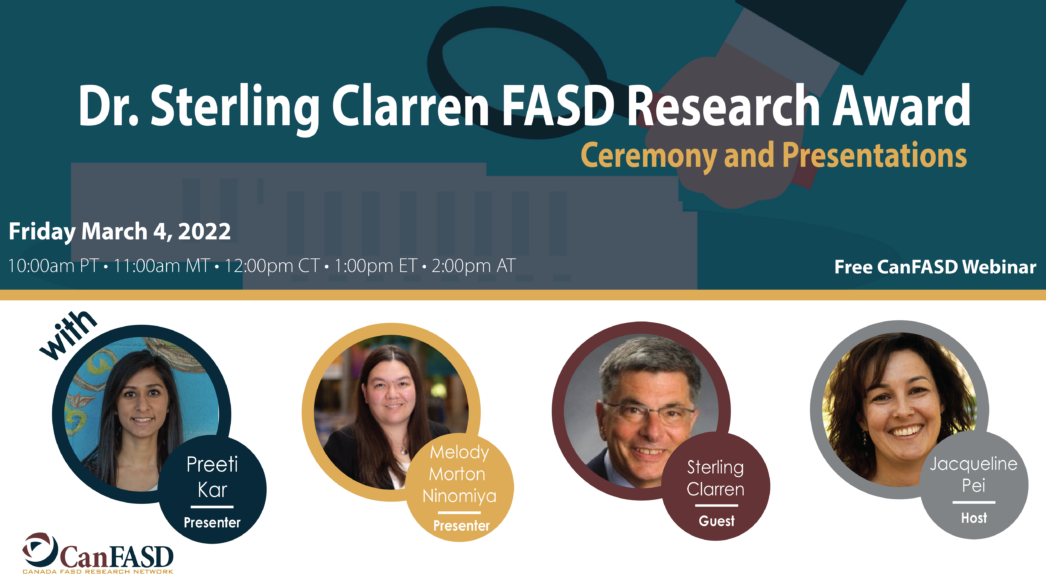We are excited to announce this year’s Dr. Sterling Clarren FASD Research Award recipients! Yes, recipients, plural. We are celebrating the work of two incredible early-career researchers this year.
The Dr. Sterling Clarren FASD Research Award is given annually to a student or early career researcher who has made a significant contribution to the field of FASD. The award was named in honour of Dr. Sterling Clarren, CanFASD founding CEO and Scientific Director, to celebrate his contribution to, and leadership in, the field of FASD. This award recognizes research that integrates policy, practice, and evidence together to improve the lives of individuals with FASD, their families, and their communities.
Without further ado, introducing our 2022 FASD Research Award recipients: Dr. Preeti Kar and Dr. Melody Morton Ninomiya.
PAE and Brain Development with Dr. Preeti Kar
Prenatal alcohol exposure (PAE) can lead to cognitive, behavioural, and motor challenges, which stem from differences in brain development. Specifically, during early childhood, extensive development takes place. These challenges linked to PAE may become more apparent at this time. Prior brain research, however, has only focused on children with PAE older than 7 years of age. My project is the first to investigate brain development in 2- to 7-year-old children with PAE.
My team completed brain scans and neuropsychological assessments in 54 children with PAE and 89 children without PAE to assess brain development. We took scans every 6 months over a period of 4 years, resulting a total of 122 PAE scans and 196 unexposed scans.
We found that young children with PAE showed slower development in frontal brain connections compared to unexposed children. These brain differences were associated with motor, language, and behavioural challenges in the PAE group. This research supports a need for earlier identification and intervention strategies for neurodevelopmental challenges associated with PAE.
Community Driven FASD Prevention with Dr. Melody Morton Ninomiya
Across the globe, many Indigenous communities are addressing alcohol use during pregnancy through collaborative and culturally relevant approaches. These approaches recognize the historical, social, political, economic, and cultural context surrounding alcohol use during pregnancy and seek to encourage the overall health and wellness of Indigenous women. We conducted this research study to determine what FASD prevention work, training, and knowledge exists in two Innu First Nations in Labrador.
Using a strengths-based approach, we identified past and existing FASD prevention-related programs, services, and approaches and used this information to inform Innu FASD prevention strategies for both communities. As this project was nearing completion, we secured funding to develop an Innu evaluation framework to accompany the prevention strategy. The evaluation framework is in the process of being completed. We are also working to ensure the FASD prevention strategy is embedded in an upcoming strategic health planning and funding envelope for these two Innu First Nations.
This study showcases how researchers can be responsive to community-driven research that is self-governed and self-determined. It highlights the value and importance of research that is initiated by First Nations to plan for and engage in FASD prevention work and it provides an example of how the TRC Call to Action #33 can be implemented.
Celebrate and learn from our recipients!
Save the date: we will be hosting an online award ceremony to celebrate these two researchers and share their work on March 4, 2022, at 1:00 pm EST. This will be an hour-long event where our recipients will also share the results and impacts of their research. Be sure to register now so you don’t miss out!

